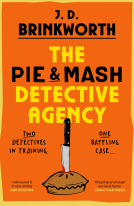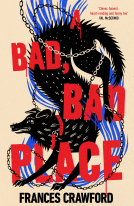
The Eskimo Solution: Shocking, hilarious and poignant noir
by Pascal Garnier
This title was previously available on NetGalley and is now archived.
Send NetGalley books directly to your Kindle or Kindle app
1
To read on a Kindle or Kindle app, please add kindle@netgalley.com as an approved email address to receive files in your Amazon account. Click here for step-by-step instructions.
2
Also find your Kindle email address within your Amazon account, and enter it here.
Pub Date 13 Sep 2016 | Archive Date 9 Sep 2016
Description
In The Eskimo Solution, the 'slyly funny' [Sunday Times] Pascal Garnier brings us a story of a writer whose imagination begins to seep into his real life.
'A gem' The Globe and Mail
Life imitates art in Pascal Garnier's offbeat tale of a crime writer and the murderous protagonist of his novel.
A crime writer uses the modest advance on his latest novel to rent a house on the Normandy coast. There should be little to distract him from his work besides walks on the windswept beach, but as he begins to tell the tale of forty-something Louis who, after dispatching his own mother, goes on to relieve others of their burdensome elderly relations events in his own life begin to overlap with the work of his imagination.
Advance Praise
PRAISE FOR PASCAL GARNIER
‘Reminiscent of Joe Orton and the more impish films of Alfred Hitchcock and Claude Chabrol’ Sunday Times
‘A guaranteed grisly thriller’ ShortList
‘Brief, brisk, ruthlessly entertaining … Garnier makes bleakness pleasurable’ John Powers, National Public Radio
Available Editions
| EDITION | Other Format |
| ISBN | 9781910477229 |
| PRICE | $14.95 (USD) |
Average rating from 40 members
Featured Reviews
 Susan M, Reviewer
Susan M, Reviewer
This short novel is basically a story within a story. The main character is an author, working on a story about Louis, his main character. In the story, Louis has found a way to help many of his friends by killing off their elderly parents, so that the children or dependents can inherit property or money and live happily ever after. As the overall story develops, so do events in the authors own life. These events start to mirror his fiction and his own life seems to almost overwhelm him.
By the end of the book I got the feeling that the main character was living two different lives, a real one and a fictional, the differences between the two being not that great. It's an interesting tale, which is well observed and cleverly written. It is, however at times a bit confusing as the story switches abruptly between the author's own story and the fictional story. This “blurring” of the lines seems to reinforce the sense that reality and fiction become one and the same.
Overall, I enjoyed this book and I can't wait to read more of Garnier's work. But for newcomers I would recommend starting with Moon in a Dead Eye where the structure of the story is much more straightforward.
 Elaine T, Reviewer
Elaine T, Reviewer
I would like to thank Netgalley and Gallic Books for an advance copy of The Eskimo Solution, another surreal Gallic tale of psychopathy.
The narrator of the novel is simply I, no name given, and he intersperses the story of an eventful few days of his life in a borrowed cottage in Normandy with the third person narrative of his new novel about Louis, a psychopath who sees himself as bringing joy into the life of his friends by killing their parents without their knowledge and letting them fulfill their dreams with their inheritance. He even gets annoyed when they don't seem overjoyed at their good luck!
Initially I found the novel quite confusing as I was dipping in and out whenever I had a minute and was never sure if it was the narrator or Louis I was reading about but I soon settled into the novel's rhythm and I just loved it.
Whether it is the translation or Mr Garnier's prose The Eskimo Solution is an extremely inviting novel. Both the narrator and Louis are not frightened to share their thoughts and that draws you in and hooks you on the intimacy of it all. It is also an extremely funny novel as both characters have no sense of humour and are completely self absorbed so they don't see either the humour or irony in their comments.
I would love to say more about the plot which is clever and ironic but no spoilers so you'll just have to read it for yourself. You won't be disappointed as I heartily recommend The Eskimo Solution to anyone looking for something a bit different.
 Elaine T, Reviewer
Elaine T, Reviewer
This is the fourth Pascal Garnier novel I’ve read and while not my favourite is still a worthwhile read.
The Eskimo Solution tells the story of Louis, an author who rents a house in order to shut himself away to write his new crime novel about a man also called Louis. The Louis of the book decides to help his friends out by killing their parents off, so that they can inherit sooner than expected, thus relieving them of their financial difficulties.
The two stories, of Louis the author and of Louis, the book’s protagonist run in parallel initially and then overlap and converge to such a degree that at times I was confused as to which Louis’s story I was following as the lines become more blurred. I suspect this may have been intentional on the part of Garnier.
Louis’s plans for solitude in order to write are foiled by various friends and acquaintances intruding on his life with their multitude of problems, which he inevitably finds himself drawn into.
This book, while written in Pascal Garnier’s usual quirky dark style with a liberal touch of humour, is not as black as some of his other novels.
 John L, Reviewer
John L, Reviewer
Meet Louis. He's a middle-aged chap, who is going nowhere, until he decides to stifle the life out of his mother. Well, she's not going anywhere either, and it only hastens her demise and boosts his inheritance when he needs to pay back a large debt. And Louis can only see it as a good thing that he is now offing elderly people to boost the monetary standing of his friends, as an unannounced service. Now meet out narrator, a thriller writer, who's inventing Louis, struggling with poorly-working typewriters in a rental cottage, and having what counts as quite the most inappropriate relationship… You'll jump from one narrative to the other in these pages, but be gripping on to everything to find the reason behind the connection.
Or at least that is the intent. For me, I found it a little bit revelatory, not about one of my favourite authors, but me, in that I wanted my cake and to eat it. I wanted the mystery of both strands – here a rampant serial killer with no qualms, a self-defined purpose and no problem with the authorities, there an innocent-seeming author, avoiding his partner's holiday plans, in fact avoiding conversation if he can, and the all-important connections between them. At the same time I both wanted them to be fully developed individual stories, and I wanted the link to be the thrust of the book.
And that link, therefore that thrust, took some time coming. The problems can be evident – namely, that however hard Garnier tries to break the form of the thriller by having a novel within a novel, both halves dripping in both blood and innocence, one half is definitely more disposable. Louis, while in a Garnier book, is created by a writer within a Garnier book, and that can only mean he's a little harder to care for, even if it's a fun Highsmith/Chabrol-styled thing to have a routine bloke going round killing the parents of his peers because the parents have stopped being valid and those peers deserve more than they have. You alternate between the two stories – Louis and his creator divide into separate chapters after a couple of scene-setters – and while I guess our two translators took care to stick to one half of the book each, the sections are too similar with too similar a style, and with equally unattributed dialogue et al failing to mark them out; even if Louis is past tense third person and the author present tense first person it can still be the font change that distinguishes the two pieces.
What's more, for being daring inasmuch as it leaves the Simenon template behind, this Garnier book suffers by, well, not reading as a Garnier book – and not quite as two Garnier short stories. While the typical French drinks are name-checked, the milieu he normally gives us is absent, and it is for his examinations of closed, ad hoc communities and what they say about the human lot that I turn to him. This, from a great thriller writer, to be featuring a thriller writer (and juvenilia writer, much as Garnier himself was) was just a little too precious. And for that connection between the halves? It smacked to me of a staple bang in the middle of a sheet of A4 – too small and insubstantial, hammering a connect between the two but leaving so much to just fly apart, when any other binding would have held the two together more firmly.
This isn't an abject failure – it bounds with ideas and blackness and Louis's nonchalance is always pleasant, but against the rest of M. Garnier's oeuvre, it does stand as a widely missed opportunity.
 Douglas O, Reviewer
Douglas O, Reviewer
As ever, Garnier holds my attention. The quality of the translation also maintains its consistency. This story is less peaceful and humorous than some but it makes its point. Elderly relatives need to die so their inheritance can be passed on. A bit brutal really!
 Wendy S, Reviewer
Wendy S, Reviewer
This is my third Pascal Garnier experience and I cannot quite believe how unique they all are! These short 'life parodies' pluck the dark trains of thought that run through the mind of ordinary folk to create a bizarrely addictive and screwball read.
Firstly, why the title? Well, as loosely described in the book, The Eskimo Solution is a way of disposing of elderly relatives by leaving them out on the ice to expire before they become a burden on their families. An effective, if somewhat, mercenary way of solving a problem I grant you, but this is the basis for the tale.
The anonymous narrator of this story has created a character in a crime novel he's writing who bumps off people's relatives and allow them to inherit early, rather than allow nature to take its course. As things progress you begin to wonder where Louis, the fictional serial killer, ends and the narrator begins. The traits of the unnamed author and his creation's traits start to resemble each other so closely that is difficult to separate them at times.
They both have trouble with their relationships, each have creative outlets, and are struggling to tell people what they really think causing them to react in unexpected ways. Only one doesn't resort to severe criminal activity to clear the air, although I strongly suspect that given the right set of circumstances he wouldn't take much persuading.
Everyday absurdities allow the writer's sharp wit and some cracking one liners to shine, as once again he projects his keen observation of situations onto the page. These warped versions of ordinary life are so fresh and intriguing that they appear almost freestyle, like there was little planning at all - and I mean that in a good way. They often they incorporate maiming, murder, and something that's gone very, very wrong with someone's personality.
While the circumstances of these thoroughly individual books appear run-of-the-mill on the surface, there's always something disconcerting waiting to break through. His writing spins the mundane around so it points in another direction of storytelling entirely.
I'm never quite sure where the next Pascal Garnier experience is going to take me and I'd be more than happy to read another one tomorrow.
 Helen M, Bookseller
Helen M, Bookseller
An author called Louis writes a book about a serial killer named Louis, while holed up in a friend's house on the coast of France next door to an old man called Louis. Confused?! You may well be!
It did take me a while to get my head around which Louis was which, however once you can pick out the Parisian vs the Normandy references then you should be OK. All the characters in the novel are pretty morally challenged - from the fictional serial killer, wiping out the elderly relatives of his friends so they can inherit their wealth before they become a penniless burden, to the author himself, who thinks nothing of sleeping with his girlfriend's sixteen year old daughter, to his best friend, Christophe, who throws his mother in law out a window following the death of his wife. At no point in the stories are the police involved or any kind of questions asked.
That said, as with all of Garnier's works that I've read so far, there are still richly drawn characters and intriguing plot lines that keep you hooked. It just felt that this one strayed too far from anything resembling reality to be believable.
 Andrew W, Reviewer
Andrew W, Reviewer
My review as posted on Goodreads:
This is the second Pascal Garnier book which I have read. The other being 'The Panda Theory' which went right over my head.
The Eskimo Solution, at 136 pages is more of a long-short-story than a full blown novel.
It has a start It has a middle Not sure about an end
There are some humorous and pithy observations about aspects of modern life. Philosophical perhaps? Confusing; certainly.
My thanks to Netgalley and the publisher, Gallic Books for a copy of this book in exchange for an honest review.
 Chris M, Reviewer
Chris M, Reviewer
I received a copy of this novel from the publisher through Netgalley in exchange for an honest review.
Gallic Books has been publishing English translations of Pascal Garnier’s very fine French noir short novels and this is cause for celebration for those who enjoy finely crafted crime stories. A year ago I had never heard to Mr. Garnier but now he is one of my all time favorite crime novelists. I would most liken him to James M. Cain but with a cutting dark humor that is all his own. Seldom are the police involved. These stories are more about crime and the usually ordinary people who commit them. And why they commit them. And the effect that it has on them.
The eskimo solution refers to the alleged practice among eskimos of providing a humane exit for their elderly when they have outlived their usefulness. To the narrator of this novel, what he finds particularly annoying about these elderly folks is that they are often sitting on a large cache of cash which could be put to much better use by their children. Our narrator is also an author, which is interesting from the whole “unreliable narrator” angle because almost immediately we begin to wonder if the writer of children’s books, who is suddenly writing a very graphic murder tale, has slipped off into some schizophrenic double existence where reality and fiction are more or less interchangeable.
To make this line even more blurred, both the narrator, who is both our narrator and of course the narrator of the novel that he is writing, shares the name Louis (which he very humorously debates with himself as to whether this is a suitable name or not) with the homicidal character in his novel. When the murder of old folks spills over from fiction into reality things get even more interesting. Or was there ever a separate reality— or was it all real? It is actually less confusing than it sounds, and a lot more fun. I think you could read this novel several times and come to different conclusions each time.
My feeling is that fiction is a test run or dress rehearsal for a potential reality, but I am sure that there are many possible interpretations. In any case, Pascal Garnier was a brilliant crime writer who will be sorely missed.
 Carol P, Reviewer
Carol P, Reviewer
I have read a few of Pascal Garnier books in the past and have to say this was the most confusing. Louis is a writer and rents a cottage to write his new novel about a man called Louis who kills his mother for the money she will leave him. It seems that this Louis feels he can help other people who are in need of money too by helping their relatives to die. Simple plot you think but no this is Pascal Garnier writing the book so the two characters seem to merge into each other and in some places you are not too sure which 'Louis' is actually narrating the story. I found it an enjoyable book but did have to concentrate in parts.
Thank you to NetGalley for the advanced copy in exchange for an honest review.
1 like ·
 Neil C, Reviewer
Neil C, Reviewer
I have to say that I found this totally confusing.
The two main characters both use the same name making the reading of the story hard work.
The good news is that it is only a short story.
The Eskimo Solution is a clever, humorous novella that is about a novelist called Louis who has holed himself up in Normandy to write a book about a serial killer called Louis. He has ignored his editor’s comments that the book will be distasteful, determined to write what he wants to.
All the way through the reader is reading the author’s account and that of his creation. It is a little confusing at first but very original and at times shocking. The Louis in the novel is a much darker character, when the reader first meets him he is arguing with his wife over whether they should opt for burial or cremation. This was one of the more humorous parts of the novel and definitely encouraged me to read more. When he murders his mother to get his hands on his inheritance he sees it as an opportunity to do the same for friends who he thinks need his assistance. It doesn’t occur to him that he might be causing suffering instead.
Author Louis’s life isn’t as straight forward as he would like, his girlfriend wants him to go to England, her daughter is making life uncomfortable and his closest friend does something that brings the novel closer to home.
It’s a very unusual read, one that I enjoyed but will have to read again to really appreciate it. Like the really good shows on TV it is what happens in the background as well that makes a success. It probably wouldn’t have worked as a full length novel, for me part of its attraction was that it was only 144 pages. I have a few books on my kindle by Pascal Garnier which I am looking forward to reading soon.
With thanks to the publisher for the copy received via NetGalley.
A thoroughly entertaining read. A novel written inside a novel, which was a novel experience! Very well translated from French, yet it doesn't lose its quirky Frenchness. They way some of them look at life. It loosely reminded me of some of Buñuel's films. Not a long book but just the right length.
 emma c, Reviewer
emma c, Reviewer
VERDICT: At the edge between fiction and reality, Garnier’s novel within a novel invites his readers to rethink morality. Where provocative and noir meet.
“Une fois n’est pas coutume”, the latest translation of a book by Garnier, The Eskimo Solution, left me disappointed, though it did contain some of his usual strong points.
The narrator of the book is actually writing a book about a character he names Louis, so it’s Garnier’s version of a book within a book. Louis is 40, living a low life, and obsessed with death. He starts killing parents of friends in need, to help them get a more happy life, like an “anonymous benefactor”. A variation on what Eskimos do with the elderly members of their family — hence the title of the book. Definitely offered her as a unique perspective on morality!
That’s interesting to note that Garnier himself ending up dying fairly young, in his early 60s.
Chapters alternate between the narrator’s life and excerpts of his own book. Of course, it sometimes takes a while to figure out whom we are talking about, especially as some elements of his work get mingled with events in his own life. Like Louis, he is forced to do things against his will.
I was actually a bit disappointed that the line between both was not even more blurry, it all felt too obvious where things were going.
But I did enjoy as always Garnier’s style, the way he does not mince his words to express his harsh view on society – and possibly too on the world of writing, as his narrator has a hard time with his editor!
In the middle of the noir, there can be humor, well, dark humor, as well. I found it in this implicit reference to a famous song by Jacques Brel:
Nat wants wine and so that’s what we drink, and if she wanted to go and look around Honfleur, we’d do that too.
Garnier not only offers provoking thoughts, he actually seems to throw them right to the face of the reader! I’d like to share a few lines illustrating this:
Tomorrow is such a handy thing. Everything you haven’t done, everything you plan to do, tomorrow! That must be the most disconcerting thing about death – no more tomorrows.
Traveling wasn’t too bad because it didn’t really feel like traveling. There were the same pedestrianized streets in the center, the same fashions, the same exasperating music everywhere – the same everything everywhere.
Except that Marion, like all tourists, did not want to be taken for a tourist, which meant interminable traipsing around rancid suburbs looking for a ‘typical’ little hotel or a ‘charming’ caff whilst lugging enormous suitcases.
A body was a stupid thing. All it needed was food and sleep, and on it went, just like any vehicle. But who was really driving it?
Sometimes, his images are so powerfully graphic they are gross:
My editor’s whinging voice has left the telephone all sticky. It was coming through the little holes in the handset like meat from a butcher’s mincer. Very unsavory.
If you are an aficionado of Garnier, I guess this book is ok, though he has trained me to expect so much more brilliancy. If you have not read him yet, I would suggest a more characteristic book of his, either Moon in a Dead Eye, The Islanders, or Too Close to the Edge.
 brian k, Reviewer
brian k, Reviewer
One of my favorite Donald Westlake novels is Jimmy the Kid, in which a motley group of criminals plan a kidnapping of a child based on a book one of them has read in prison, in which the kidnapping of a child is plotted and carried out. Westlake includes relevant chapters of Child Heist (written by Richard Stark, which happens to be a pen name of Donald Westlake) in Jimmy the Kid. And this story within a story device works brilliantly and one reads with glee as the kidnapping goes wrong.
Pascal Garnier flips this formula in The Eskimo Solution. This novel opens with the opening chapter of a novel by a writer named Louis about a man named Louis who is unhappy with his lot in life and concludes that killing his mother would be the solution to his problems. And when it works, Louis realizes several of his friends could also benefit from such acts and if he did the job himself, his friends would never know and never be caught. As the real Louis explains to his editor:
“Wait a minute, let me go on. It’s a very modest inheritance - but that’s beside the point. Since everything goes to plan, no trouble with the law or anything, he starts killing the parents of friends in need. Of course, he doesn’t tell them what he’s doing - it’s his little secret, pure charity. He’s an anonymous benefactor, if you like.”
“He kills people’s parents the way Eskimos leave their elders on a patch of ice because … it’s natural, ecologically sound, a lot more humane and far more economical than endlessly prolonging their suffering in a dismal nursing home.”
As the real Louis writes his novel about the fictitious, murderous Louis, Garnier treats us to installments of the novel in progress as he tells us the real Louis’s story. The real Louis holes up in a rented house in Normandy to write the novel and to hide from his own troubles and the troubles of his friends, which begin to resemble the troubles of the fictional Louis. And when the fictional solutions begin to occur in the real world, the fun (or the misery) begins.
Bleak, funny, unpredictable, The Eskimo Solution is tremendously enjoyable. Pascal Garnier died in 2010 and it is only recently that his novels have begun to be translated into English. Gallic Books has published nine of his books so far, which is fortunate because as soon as I finished The Eskimo Solution, I wanted more Garnier. Anyone who appreciates the work of Patricia Highsmith, Donald Westlake, Georges Simenon, Jean-Patrick Manchette, or J.G. Ballard should prove to be a natural reader of Pascal Garnier.
 Sara S, Reviewer
Sara S, Reviewer
Before I read this book, I had never heard of the author, Pascal Garnier. I looked him up and read descriptions like: "topics are dark and depressing" "very noir" "typical french negative"
So I settled in for a read that I wasn't expecting to like and knew I could stop and say why?
I read the book in two sittings, one day. I found it delightful, witty, surprising and fun. Where were all the dark and depressing thoughts?
The story is about a writer named Louis who is given an advance on a book, rents a place on the Normandie coast and writes about a man named Louis. Every other chapter is Louis #1's voice and in-between Louis #2s voice. It is easy to tell the difference as each voice has a clear and distinctive type. By the end, the two stories are bumping up against each other and the Louis's are overlapping. It is a romp through murderous silliness and humorous dialogue. I was reminded of the movie "Django Unchained". For example, blood would go upwards two or three feet when logically it should go down. It was cartoonish and one had to laugh.
The publisher, Gallic Books, has translated nine of Garnier's books from the original french. Garnier himself died in 2010 and not able to enjoy what a delight he is to English speaking readers. The translation is very smooth with no oddities that can sometimes be found in bad translations. Kudos to Gallic Books for bringing us Pascal Garnier.
 Jemima P, Reviewer
Jemima P, Reviewer
The blurb likens the author to Simenon and Camus; I confess I've never read any Simenon and seem to remember not finishing the Camus I tried. This is not a problem if you pick up this novella length story by Pascal Garnier. If you like your stories off-beat you're in for a treat. One thing you should guard against, though, is being interrupted in the middle of it, since it's easy to get confused.
One of the difficulties is both the protagonist and the hero of the novel he is writing are called Louis, and although the novel and the actual story are in different fonts (which helps) remembering which is which can be a challenge for those like me with the short-term memory of a woodlouse. However, I don't think it really matters which is 'true' and which is fiction, since both are weird and cross-over with each other. I felt that the fiction was in a more literary style, which was clever, but I may have been reading them the wrong way round at the time. The plots are off-beat, fascinating, and strangely engrossing. It seemed to tail off at the end, and I wasn't really satisfied with the conclusion, but I might read it again, without unscheduled interruptions, and see what I think. And in any case, it's a lovely picture of life in France, with some sea and Impressionist art references thrown in.
If you like your crime stories gentle, mystifying and weird, try this!
A novella length story translated from the French. Somewhat surreal, and potentially confusing, but then that's what adds to the intrigue.
 Leslie G, Book Trade Professional
Leslie G, Book Trade Professional
Clever and brilliant plotting by unscrupulous self-aware perpetrator: this is funny and gruesome in equal measures - biting comedy - Louis does those things we think too are clever ruses and that's why this almost experimental novel is so successful and hilarious--unreliable.but also mauve narrator.. another genius ploy for novel Here ... Ever wanted to do away with your aged wealthy mother who never uses all her money anyway? Coincidently there's cling film available - who would have thought it ... And other 'innocent' schemes
 E V, Reviewer
E V, Reviewer
Louis is the author of children’s books. He pitches a new story, to his not impressed editor, about a 40 year old man who kills his mother for the inheritance. He also does similar favors for his unknowing friends. As Louis writes, his own life takes unexpected twists. Although I am a big Garnier fan, I was disappointed with this book. I found the bouncing back and forth between Louis the author and Louis the character to be confusing. I did appreciate the creativity in some of the murders.
 Cindy H, Reviewer
Cindy H, Reviewer
I had a hard time getting into this story. Twice I started over from the beginning. The second time I was able to read the entire book. Having two characters named Louis added to my confusion! I wanted to like this book but it was just an strange story.
* I was provided a copy of this book from the publisher and NetGally to read and write my honest review.
 Daphne S, Reviewer
Daphne S, Reviewer
The Eskimo Solution is a story told in two parts. We have a modern day narrator and writer and Louis, his fictional creation. The premise is that Louis is fed up waiting for his inheritance, so decides to kill his mother so he can have the life he believes he deserves. He then wonders whether any of his acquaintances would also benefit from an early gift of money, would the benefit of a solvent life outweigh the sadness of losing a family member.
Steps are taken and the number of murders duly increase and the feeling is that fact and fiction are becoming intertwined too closely and doubts grow about the narrator and Louis's sanity.
When Christophe, a close friend of the narrator, commits murder and then shortly afterwards dies, this marks the beginning of a deeper understanding of the rights and wrongs of previous events and the dawning of a more sober and sensible narrator.
I loved the dark humour of this book and its subversive elements. It asks uncomfortable questions and is also concerned with the modern dilemmas about the older generations. Are they using up too many resources and should they be encouraged to make way for the younger generations? Not exactly in a murderous sense , but with the existence of Dignitas, the emphasis has changed over the years as to what constitutes a good old age and can it be justified in a pure monetary sense.
I am delighted that these novels have been translated and published albeit posthumously, they are ironic and full of gallows humour and are to be throughly recommended to all.
I will post a review on Goodreads later. I don't post on Amazon as my account was hacked last year.
Oh how I love a little quirk in my reading and this is a great example. The Eskimo Solution tells the tale of Louis and Louis, one real and the other the chief character in a book that the first Louis is writing. Oh yes, and his neighbour is also called Louis. The novella opens with Louis (the character in the book) recalling an argument he's had with his friend Alice about whether to be buried or cremated after death. It all boils down to money. Louis (the writer) thinks that maybe the Eskimos have the perfect solution - leaving their elders on a patch of ice. No mess, no monetary demands. In fact, talking of money - what are these old people doing sitting around on piles of cash that their offspring could put to much better use?
And so Louis's (the writer's) book for children turns into something dark and murderous. After offing his mother-in-law via defenestration (a.k.a. chucking her out of the window), Louis (the character) thinks he may be able to help others in a similar way. As the story progresses, lines between the two Louis become increasingly blurred.
I really enjoyed this blackly humorous read by Pascal Garnier and of course must mention the translator Emily Boyce for ensuring that we English readers get to read the book as the author intended. Kudos to Gallic Books for continuing to supply these Gallic gems to an English audience.
 Kath B, Reviewer
Kath B, Reviewer
I am not sure what drew me to this book, maybe the fact that I have read quite a few books translated from German and wanted to try a French author instead. I recall reading Simenon's Maigret books when I was a young adult and enjoyed those and the blurb here says that Garnier is a similar style to Simenon so, I thought I'd give this a go.
Firstly, I have to say that I found the translation to be excellent. In fact, to me, the book read as if it was actually written in English from scratch. The meaning of the words was paraphrased rather than directly translated which meant, for me anyway, the whole book read smoothly.
The store we have here is really a book within a book with the lines between them slowly blurring as the story progresses. We follow Louis as he hides himself away by the sea to write his book about Louis who, after having killed his own mother, branches out to relieving others of burdensome ageing relatives (whether they want it or not). And then we have Louis, the old guy who lives next door to real Louis. You'd think that there'd be too many Louis in the book, but the old and young are easily differentiated and the chapters from the real and character Louis are written in different font so they are easy too.
The whole premise of the book I think is that art overspills to life as morals become looser. I didn't really like real Louis at all as I found him to have extremely questionable morals at times. On the other hand, he was also good to his neighbours (to a point) but even then, well... you'll see if you read the book. It's hard to say much more about the story or feeling invoked whilst reading as I fear it will turn out to include spoilers, but suffice to say, I did go through quite a few whilst reading. It was funny and serious all at the same time, but that worked really well. I was also disgusted, charmed, angry, and totally engrossed in the surreal storyline I became totally immersed in.
All in all, I think this was a good solid read and I am definitely going to check out some of the author's other books.
I received a free ARC of this book in exchange for my honest review
 Mandy J, Reviewer
Mandy J, Reviewer
Pascal Garnier is on top form with this short novel, and I found it as compelling, if not more so, than some of his others. Here we have a writer called Louis who has an idea about killing off old people so that their children can inherit a bit earlier than otherwise planned. There’s no malice in the idea – it just seems a practical one. So he starts to write about a man called Louis who has the idea of killing off old people……
Reality and fiction merge in this bleak, funny and original book , another little Garnier gem.
Readers who liked this book also liked:
Clare Chase
Mystery & Thrillers


















